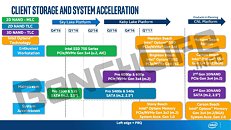- Joined
- Oct 9, 2007
- Messages
- 47,849 (7.39/day)
- Location
- Dublin, Ireland
| System Name | RBMK-1000 |
|---|---|
| Processor | AMD Ryzen 7 5700G |
| Motherboard | Gigabyte B550 AORUS Elite V2 |
| Cooling | DeepCool Gammax L240 V2 |
| Memory | 2x 16GB DDR4-3200 |
| Video Card(s) | Galax RTX 4070 Ti EX |
| Storage | Samsung 990 1TB |
| Display(s) | BenQ 1440p 60 Hz 27-inch |
| Case | Corsair Carbide 100R |
| Audio Device(s) | ASUS SupremeFX S1220A |
| Power Supply | Cooler Master MWE Gold 650W |
| Mouse | ASUS ROG Strix Impact |
| Keyboard | Gamdias Hermes E2 |
| Software | Windows 11 Pro |
Intel's first client SSDs based on the company's revolutionary 3D XPoint memory technology, under the company's new Optane brand, could debut alongside the company's 7th generation Core "Kaby Lake" processors (late-2016), according to a leaked company slide. According to the slide, the company could launch at least three Optane branded SSD lines in either late Q4-2016 or Q1-2017, addressing three distinct market segments.
Leading the pack is the Optane "Mansion Beach" SSD, positioned in the upper-end of the "Enthusiast Workstation" segment, with PCIe gen 3.0 x4 interface, and NVMe support. A notch underneath this is the Optane "Brighton Beach" series, featuring PCIe gen 3.0 x2 interface. Interestingly, Intel doesn't have a mainstream SSD based on the 3D XPoint tech around this time, yet has an entry-level "System Accelerator" segment drive codenamed "Stony Beach," which also takes advantage of PCIe gen 3.0 x2. This drive comes in M.2 form-factor. Some time later (2018?), the company plans to launch a single-chip successor to "Stony Beach," codenamed "Carson Beach."

View at TechPowerUp Main Site
Leading the pack is the Optane "Mansion Beach" SSD, positioned in the upper-end of the "Enthusiast Workstation" segment, with PCIe gen 3.0 x4 interface, and NVMe support. A notch underneath this is the Optane "Brighton Beach" series, featuring PCIe gen 3.0 x2 interface. Interestingly, Intel doesn't have a mainstream SSD based on the 3D XPoint tech around this time, yet has an entry-level "System Accelerator" segment drive codenamed "Stony Beach," which also takes advantage of PCIe gen 3.0 x2. This drive comes in M.2 form-factor. Some time later (2018?), the company plans to launch a single-chip successor to "Stony Beach," codenamed "Carson Beach."

View at TechPowerUp Main Site



